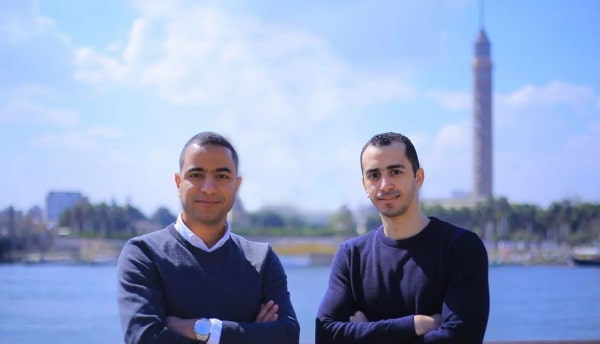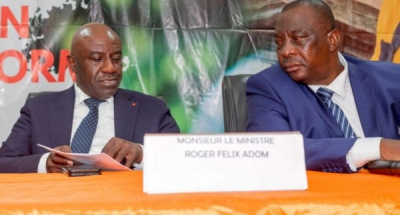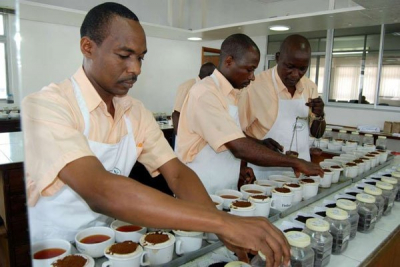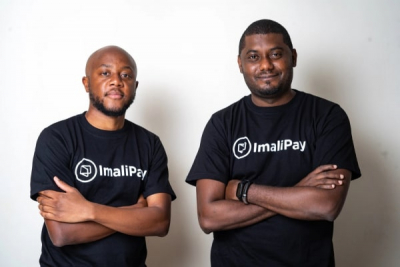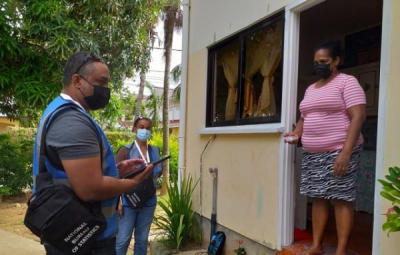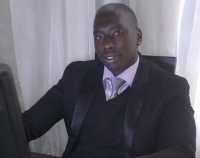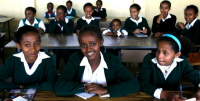E-commerce proved indispensable for the continuation of business activities amid the pandemic in 2020 when the world was hit by social restrictions. As a result, the global revenue of this segment which stood at US$3.351 trillion in 2019, jumped to US$4.248 trillion in 2020, according to Statista.
In Africa, the same trend was observed with e-commerce revenues growing by more than US$6 billion to $27.97 billion in 2020. Despite the growth, Africa’s 2020 e-commerce revenues represented less than 3% of the global revenues. This reflects the continent’s low readiness for new retail opportunities.
In its report "E-Commerce and the Digital Economy in LDCs: At Breaking Point in COVID-19 Times" published on March 15, 2022, the United Nations Conference on Trade and Development (UNCTAD) listed several negative factors that contributed to Africa's modest global e-commerce performance.
Lack of political interest, difficult access to the Internet, the digital divide, low investments in e-commerce activities, supply chain disruptions, lack of consumer protection and fair competition rules, and the persistent practices of cash on delivery are the main factors listed by the UNCTAD.
A glance at the UNCTAD's Business to Consumer (B2C) e-commerce index -which measures an economy's readiness to engage in and benefit from e-commerce- shows that Africa has been the lowest-ranked in the past six years. For the UNCTAD, the situation must appeal to governments and prompt them to take strong actions to make sure the continent can reap the rewards of the digital economy.
Since 2017, UNCTAD has been helping countries improve their e-business readiness. Through the eTrade Readiness Assessments (eT Readies), it helps them assess and correct their e-commerce development strategies, the quality of ICT infrastructure and services, trade facilitation and logistics available, the payment solutions as well as the legal and regulatory frameworks. It also points to the skills to be developed and assesses if there is compelling access to finance.
In December 2021, 46 eT Readies requests, including 15 from African countries, were submitted to the UNCTAD. Of the 15 submitted by African countries, six have been completed, two are still in progress, and seven are not yet processed.
Muriel Edjo
In Egypt, e-health startup Otida helps people with diabetes manage their daily lives by being their nutritionist, fitness coach, or doctor. The startup wants to help its users maintain normal blood sugar levels without taking drugs or resorting to surgery but, with a program adapted to each user.
The Otida method can be summarized as nutritional therapy and personal coaching to avert diabetes complications such as cardiovascular disease, and eye and foot problems... The service costs EGP3,500 (about US$190).
Recently, the startup completed a US$340,000 funding round to improve the lives of 5,000 people suffering from diabetes in Egypt and the Middle East.
According to Ahmed Tawfic (photo, left), founder and CEO of Otida, "with the level of technology we are surrounded by today, it’s unacceptable to have patients with diabetes still struggling to find the right treatment program that fits each condition.”
To access the services offered by the health tech, users must first register on its web platform by entering personal information such as email, phone number, name, weight, and height. They then receive a glucose measurement kit (CGM kit) to measure their blood sugar level every 15 minutes for 10 days. They are also required to keep track of their eating habits to give an objective idea of their metabolism.
The data collected is directly sent to the startup’s cloud, and analyzed by specialists who will elaborate the most effective program for each individual. Every subscriber is assigned a sports coach available 24 hours a day.
Adoni Conrad Quenum
Côte d’Ivoire’s Ministry of Digital Economy launched, Thursday (April 7), in Daloa, a digital platform for agricultural services. Dubbed AgriStore, the platform will help improve farmers’ productivity and facilitate commercial relationships in the agriculture value chain.
"Our agriculture sector must capitalize on digitization to improve operations in its value chains,” said Minister of Economy Roger Félix Adom (photo, left), at the launch ceremony attended by his peers of the Ministries of Agriculture and Promotion of Good Governance.
In collaboration with the National Agency for Support to Rural Development (ANADER), AgriStore will provide agro-meteorological information and agricultural advice to its users. To facilitate the AgriStore’s operations, the operational capacities of the Ivorian marketing assistance board (OCPV) have been strengthened to cover all the areas served by the digital platform, informs OCPV coordinator Adjoumani Boffoué. That way, he explains, the assistance board will collect information on the available stocks, their location, and prices for listing on AgriStore.
AgriStore was developed in the framework of the Digital Solutions Project for Opening Up Rural Areas and E-Agriculture (PSDEA). Funded to the tune of XOF37 billion (US$61.3 million) by the International Development Association (IDA), the development of that platform started in November 2018. It aims to make the Ivorian agriculture sector efficient and competitive by reducing production costs and improving quality.
According to the PSDEA coordinator in charge of digital services, Abdoul Karim Koné, farmers registered on the platform will periodically receive market alerts (SMS and voice messages) in the languages most spoken in the project areas. The market alerts will provide information on rice, corn, cassava, yam, plantain, shea, chicken, guinea fowl, and vegetables. The platform’s services are entirely free, he stresses.
AgriStore will cover ten administrative regions with high agricultural production, namely Haut Sassandra, Marahoué, Bounkani, Poro, Tchologo, Bagoué, Kabadougou, Folon, Gôh and Loh-Djiboua. To ensure the success of the process, required investments will be made in rural connectivity, digital services, and rural road rehabilitation, the Minister of the Digital Economy informs.
Ruben Tchounyabe
In Kenya, transactions at the Mombasa tea auction house are now exclusively performed online through the electronic portal iTTS (Integrated Tea Trading System). With the US$2.12 million portal, the Mombasa Tea Auction House officially ends its physical interactions with tea traders.
For Arthur Sawe, chairperson of the East African Tea Trade Association (EATTA), the portal funded by the Danish International Development Agency (DANIDA), will boost tea traders' and farmers’ benefits by reducing operating costs.
“The digitization seeks to fill gaps in the current procedures, which are done manually including membership and cataloging,” he added
According to Morgens Strunge Lursen, Councilor at the Danish embassy in Kenya, "the launch of the iTTS is particularly exciting because it helps position such a critical sector for future growth and success by driving efficiency and supporting both increased traceability and information exchange."
The Mombasa Tea Auction House serves Kenya, Mozambique, Tanzania, Malawi, Burundi, Ethiopia, DRC, Rwanda, Madagascar, and Uganda. Its digitization, which led to the creation of the iTTS portal, began in May 2020 at the start of the coronavirus pandemic. It helped the industry respect social distancing requirements by allowing buyers to place their tea bids online. After a two-year pilot phase, the iTTS portal was launched on March 31, 2022.
According to a release announcing the launch, “in time, iTTS is expected to shorten the pre-auction, auction and post-auction stages; create the potential for increased frequency in trading volumes; reduce the tea trading cycle by about 65 percent from the current 45 to 60 days to less than a month; and, fast track payments to farmers and reduce the need to take loans to finance farming operation.”
Users will only need connected devices (phones for instance) to track the tea they bought through auctions from factories to shipping companies. The portal also includes features allowing resellers to analyze global market trends. According to Kenya's Permanent Secretary for the East African Community, Kevit Desai, “the manual procedure involves middlemen, producers, warehouses, brokers, buyers. (...) The trickle-down effect was that farmers had little say in the prices of their tea but the new system is inclusive, and farmers will benefit immensely.”
The iTTS “will ensure that stakeholders of the tea auction, including farmers, buyers, and sellers receive real-time information on what is happening on the auction bourse, which will boost confidence in the Process,” concludes EATTA Managing Director, Edward Mudibo.
Ruben Tchounyabe
Fintech startup ImaliPay announced on Thursday (April 7), the successful completion of a US$3 million funding round. The startup -founded by Tatenda Furusa (photo, left) and Oluwasanmi Akinmusire (photo, right)- will use the funds to expand its team with new talents, improve its one-stop-shop platform, and enter new markets (Ghana and Egypt in that instance).
Currently, ImaliPay’s app is available only on Play Store. Through its app and thanks to strategic partners, the startup offers actors of the gig economy access to various financial services still inaccessible to them. The services include Buy Now Pay Later, investments, savings, and insurance.
“We researched the gig economy and found that they were neglected by some financial services. And we saw that we were perfectly placed on building a fintech solving the problems of Africa’s gig economy workers, freelancers, and self-employed digital workers,” explains Tatenda Furusa, CEO of ImaliPay.
The CEO obtained a business and management master's from the University of Nottingham, UK, in 2017. His co-founder Oluwasanmi Akinmusire graduated with a Master of Business Administration, from Ajayi Crowther University in Oyo, Nigeria, in 2019. The two partners worked at Cellulant, a pan-African firm that provides local alternative payment solutions for global, regional, and local merchants. They want to foster financial inclusion in Africa, whose citizens are excluded from most of the traditional financial services.
In 15 months of operation, ImaliPay's user base has grown 60-fold, and the fintech claims over 200,000 transactions via its platform. Freelancers can access its services at 4,500 physical outlets.
Adoni Conrad Quenum
ICTs have many goals, including the reduction of time needed to collect and process data. The project, in this form, gives the State more flexibility in how it uses collected data.
Seychelles will start its first nationwide digital census on April 22, 2022. It will collect data on its population, households, and voters, said on April 5 the deputy director-general of the National Bureau of Statistics (NBS), Helena Butler-Payette. Unlike previous years where the census was done using forms to be filled, this year it will be fully digital.
“One of the biggest changes in the way we do things resides in the digitalization of census,” said Butler-Payette while adding that training sessions, for about 500 door-to-door surveying agents, have already started.
Since it became independent, Seychelles has carried out six census operations; the first two in 1977 and 1987. The following censuses (1994, 1997, 2002, and 2010) focused on meeting national needs, especially the delineation of administrative borders. According to the NBS, Seychelles had 99,728 residents in 2021, 0.8% more than the figure recorded in 2020. This year’s census should have taken place in 2020 (it takes place every 10 years) but it was postponed to 2022 due to the Covid-19 pandemic.
In addition to data on the population and households, agents deployed will also gather voters’ data. Commenting on the operation, Helena Butler-Payette said it is better to use the same resources now to carry out the two surveys instead of wasting money doing both separately. Overall, the government plans to spend 904,000$ on the operation.
The NBS believes that conducting the survey digitally would allow results to be obtained more rapidly. “Before, it took us nearly a year to draw reports from the data we collected during the census, but this time, it will take us only weeks or months,” the NBS official declared.
Ruben Tchounyabe
Algerian entrepreneur Noureddine Tayebi, heads, from Silicon Valley, Yassir, a carpooling and home-delivery app. The platform, which works in Africa, Europe, and America, aims to diversify its offer and expand to french-speaking markets in sub-Saharan Africa.
After studying engineering in Algeria, Noureddine Tayebi (photo) flew to the U.S. in 1998 to pursue a master's degree in electrical engineering at the University of Urbana-Champaign, Illinois. After graduating, he went on to earn a Ph.D. in electrical engineering from Stanford University. In the late 2000s, he moved to Silicon Valley where he started working for Intel. There, he spent over eight years acquiring product management and marketing skills. He also gained real start-up experience at the US microprocessor and semiconductor manufacturer.
However, his entrepreneurial journey started in 2011, after securing 23 patents. In 2014, he founded his first company called InSense, specializing in nano-motion sensors, launched with two grants totaling $1.6 million. He later sold the business to a Silicon Valley company. In 2017, he co-founded Yassir. Originally deployed as a cab app, the platform has since diversified into fast food and grocery deliveries with Yassir Express, and most recently, with Yassir Market into grocery delivery.
The startup claims three million active users across Algeria, Canada, France, Morocco, and Tunisia. Over the past five years, its turnover has been growing steadily (up to 40% per month). The app has helped, indirectly, create more than 40,000 jobs for drivers and delivery workers. In November 2021, Yassir closed a $30 million fundraising round with U.S. investors for its development. So far, the entrepreneur has successfully raised $67.6 million from 30 investors.
In the short run, Noureddine Tayebi's ambition is to develop Yassir in sub-Saharan Africa, especially in French-speaking countries like Senegal, Ivory Coast, Togo, Benin, Mali, and Cameroon. The Algerian affirms that the application is already working in Senegal, and other major markets on the continent such as South Africa, Nigeria, and Egypt.
"The goal is to create the largest technology company, not only in Africa but in the world. To achieve this, we need to be present in many markets," he says.
Aïsha Moyouzame
Robert Muoka Salim (photo) is a Kenyan techpreneur and sociopreneur. He is the CEO and co-founder of My Shamba Digital, an online legal platform selected on March 1, 2022, to join the Venture Capital for Africa (VC4A) program.
My Shamba Digital helps citizens complete their land procedures, and avoid scams and other bad decisions that can lead to disputes between individuals, companies, or the state. Its resource center and blog also provide users with access to important land-related information. Apart from its resource center and blog, the platform also has real estate and land listing pages, My Shamba Digital Property Listings, and My Shamba Sako.
Robert Muoka Salim launched My Shamba Digital in the first quarter of 2021. But, he got the idea several years back because of land dispute cases he came across during his professional career. In 2017, the Kenyan Ministry of Lands and Physical Planning signaled an increase in land fraud and related crimes over the previous decade. At the time, it indicated 7,052 land fraud cases costing the treasury Ksh60 billion (US$520 million) yearly.
Land affairs are not the only cases in which Robert Muoka is specialized. In 2020, he co-founded the digital platform Sheria Online, which specializes in legal coaching, and is currently responsible for business development and strategic partnerships.
For his digital solutions, he was listed in the Africa Law Tech and Lawyers Hub's Top 50 African Legal Innovators (2021). He also received the award for the best technological solution at the Africa Legal Innovation Hackathon 2021. He was also the finalist of the Global Legal Hackathon 2022 and one of the nominees for the Under-30 Techpreneur of the Year at the 2022 Founder of the Year Awards.
Melchior Koba
Presented as the first venture builder in Morocco and Africa, "Moroccan Retail Tech Builder" aims to help entrepreneurs develop innovative digital solutions tailored to the e-commerce industry.
Morocco officially launched Moroccan Retail Tech Builder (MRTB), a platform for the digitalization of the retail sector, on Thursday, April 7. The platform aims to support project leaders in the development of innovative, simple, and accessible digital solutions to help retailers upgrade their operations and create more value.
For Ryad Mezzour, the Minister of Industry and Trade who chaired the ceremony, the MRTB “initiates the digital shift of a vital sector, which played a crucial role during the pandemic and is also one of the strong segments of our economy.”
According to Hicham El Habti, President of Mohammed VI Polytechnic University (UM6P), qualitative changes are already observed in the operating methods of the retail sector, which is one of the backbones of African economies.
“The flow of ideas and the potential of that sector call for solutions to incubate, support, and accelerate startups and promising projects in that area,” stressed Hicham El Habti.
MRTB is part of the authorities’ plan for the recovery of the retail sector. One of the key points of that plan is to digitize the sector for enhanced competitiveness. The plan includes acceleration of the digital transformation, generalization of digital services as well as simplification of administrative formalities and procedures in line with the country’s economic and institutional reforms.
Ryad Mezzour believes MRTB will allow retailers to enhance their contribution to economic growth in Morocco by modernizing their operations, boosting turnover, and enhancing competitiveness while tailoring their offers to clients’ needs and requirements.
As far as Hicham El Habti is concerned, with MRTB, the UM6P will improve the support it provides through its startup campus, StartGate, for improved socio-economic development.
The venture builder will transform the national entrepreneurial ecosystem into a collaborative space that exposes startups to various knowledge sources. That way, it can help them implement creative processes for the development of innovative solutions useful for Africa, as a whole, indicates Abdelhadi Sohib, Secretary-General of the OCP Foundation.
For its initial operations, the MRTB has launched the recruitment of 100 startups that will benefit from its services till 2024.
Ruben Tchounyabe
The first phase of Ethiopia’s blockchain-based national student and teacher ID and attainment recording system will be launched in “the next two months,” announces IOHK, the U.S. firm that developed the blockchain platform Cardano.
The said system will allow the government to remotely monitor academic performance in secondary schools as well as verify students’ identities and grades. Ultimately, it will give authorities an idea of the impact of the national education policies on employment nationwide and allow employers to easily validate applicants’ credentials.
In its first phase, the system based on IOHK’s blockchain solution Atala Prism will target 800,000 students. Eventually, the recording system will include 3,500 schools, five million students, and 750,000 teachers, per the agreement between the Ethiopian government and IOHK.
“We have completed the first pilot and are beginning to train users at the Ministry of Education on functionality and usage,” indicates John O'Connor, IOHK Director of African Operation.
Launched in April 2014, the project is part of Digital Ethiopia 2025, the national strategy validated by the government in 2020 to transform several strategic sectors like public administration, health, agriculture, and education.
“We truly believe that this project could light the touchpaper for a wave of third-generation blockchain innovation across Africa and the developing world, bringing vital services to those who have previously been unable to access them,” John O’Connor commented.
Adoni Conrad Quenum
More...
The expense management tools developed by Expensya, a Tunisian startup launched in 2014, have become some of the most trusted solutions in Europe.
While working as engineers in France, in the early 2010s, Tunisians Karim Jouini (photo, left) and Jihed Othmani (photo, right) realized that expense management -expenses recording and tracking especially- was manual and complicated for companies. Most of the existing tools were only accessible on computers even though there were some mobile billing and expense management solutions. Also, the government’s invoice processing policy was still inefficient.
They then started developing their own expense management tools. Back in Tunisia in 2014, they founded Expensya, a startup offering corporate expense management solutions. In 2016, 2017, and 2018, they completed funding rounds to develop their operations. Three years later, Expensya raised US$20 million from French and German investors, notably MAIF Avenir, Silicon Badia, ISAI, and Seventure Partners.
Once introduced in the market, Expensya’s management tools quickly became the legal digital invoice archive in France. The startup later expanded in Europe and Africa. According to Karim Jouini, the start-up is operational in more than 90 countries and serves nearly 6,000 companies. "In 2014, when Expensya started, companies still used Excel spreadsheets or some form of bespoke data entry solution—the ‘so-called’ existing solution—to record and track their expenses," he told TechCabal.
In February 2022, Expensya launched payment cards in the European market with plans to introduce that solution into its African markets. Thanks to the cards issued by Expensya (virtual or physical), clients’ employees can make sure the expenses they make comply with their company’s pending policy.
“Employees could only request to be reimbursed after spending before now but with our card, they can now spend in real-time (...) and our software ensures that they are respecting the company’s spending policy and that of the country they are spending from,” explained Karim Jouini.
Aïsha Moyouzame
Cameroon is currently moving to dematerialize and streamline civil service procedures. On Wednesday, during a press briefing in Yaoundé, Minister of Public Service and Administrative Reform Joseph Le (photo) announced a set of measures in that regard. According to the government official, the 2022 finance law includes a budget line dedicated to the acquisition of tech equipment specifically dedicated to the authentication of various diplomas.
The equipment will be a collaborative platform allowing collaboration between the Ministry of Public Service, the Ministry of Public Health, and the Ministries of Primary, Secondary, and Higher Education.
“With just one click, I can find all the information I need right from my office,” explains Joseph Le. He also announces the digitization of the documents that make up the integration files of graduates of teacher training colleges from the first week after the end of their training.
Few years ago, Cameroon acquired an IT system for integrated management of state personnel (SIGIPES). However, some civil servants usually spend the first years of their careers without some salaries and bonuses. For instance, from January to March 2022, a strike organized by secondary school teachers disrupted classes. The teachers were denouncing delays in the payment of their salaries and bonuses.
In response to this protest movement, the President of the Republic, Paul Biya, instructed the optimization of the civil servants’ management system. For the Minister of the Public Service, the challenge causing delays in the payment of the salaries and bonuses demanded by the teachers is the authentication of various diplomas as well as recognition and equivalence of educational qualifications. Also, the procedure for the integration of teachers who graduated from teacher training colleges is not streamlined, he adds.
According to the government, the reforms announced will reduce the time it takes for civil servants’ files to be effectively processed to reach the central administration. Currently, it takes 25 to 30 months. However, with the announced digitization, all the involved administration will receive the files at the same time and the processing and matriculation processes will start at the same time.
Once the procedures are dematerialized and streamlined, graduates from teachers’ training colleges will no longer have to wait for two to three years to be matriculated into the civil service. Instead, they will just have to wait for “45 to 90, maybe less than that,” assures Minister Joseph Le.
Ruben Tchounyabe
In Africa, governments have been on the move, since 2019, to accelerate digital transformation. For that purpose, they are putting appropriate frameworks in place to facilitate the shift.
Congo plans to create a digital development agency. The draft project was presented during the March 6, 2022, Ministerial council. The aim is to use the agency as a tool to accelerate the country’s digital transition. The agency will be created by transforming the Directorate-General for the Development of the Digital Economy into a public administrative institution.
For Léon Juste Ibombo (photo), Minister of Posts, Telecommunications and the Digital Economy, "digital transition (...) requires significant investments, particularly in infrastructure, networks, equipment, content…”
In that regard, the planned agency (which will be an autonomous agency) will support digital projects, optimize the digital transition models chosen by institutions and implement new technologies in the national territory. The bill consecrating the creation of Congo’s agency for the development of the digital agency will soon be submitted to parliament for review and adoption.
The Covid-19 pandemic has accelerated digital transformation in the world. The pandemic prompted Congo, like many African countries, to take action for the development of its digital economy. Examples include the creation of an African Center for Artificial Intelligence Research (Caria) in February and the establishment of a legal framework governing startups’ operations.
Adoni Conrad Quenum
To improve health services in Uganda, Dr. Davis Musinguzi created a telemedicine platform called Rocket Health. His start-up recently raised US$5 million for its East African expansion.
Dr. Davis Musinguzi (photo) is a Ugandan HealthTech entrepreneur with a degree in healthcare management. Almost all of his career in digital health was spent with UNICEF, through which he designed, managed, and evaluated health informatics and technology programs for ministries of health, international organizations, and academic institutions. In 2006, he entered the entrepreneurial world with the sale of nutritional supplements. He later co-designed WinSenga, a mobile app that can be used to scan pregnant women for complications. In 2012, WinSenga won him and his co-developers the Microsoft Imagine Cup.
After his appearance on the TV Show Inspire Africa, he won US$50,000 startup financing from the Warid Entrepreneurship Fund to launch The Medical Concierge Group (TMCG), the startup managing Rocket Health Africa Corp since 2012.
His startup was created to improve the health services provided to Ugandans by developing a platform through which they could have an early prognosis. Partnering with John Mark Bwanika, Fiona Nuwamanya, Hope Achiro, and William Lubega, all from the healthcare industry, Davis Musinguzi launched Rocket Health, a telemedicine platform.
Using artificial intelligence, Rocket Health offers customized health services, teleconsultations with doctors, last-mile drug delivery, swabs collection, and lab result delivery. It also offers digital health consulting and research for health institutions and projects in Africa.
At first, clients and potential staff members were reluctant about Rocket Health since they were not familiar with the telemedicine concept, Davis Musinguzi indicates. However, through referrals, the platform quickly reached an extended client base. The entrepreneur now employs about 30 physicians who provide services to 40,000 clients registered on the Rocket Health platform. With the Covid-19 pandemic, demand for the services offered by the platform climbed to a record 400,000 virtual consultations yearly.
Dr. Davis Musinguzi’s achievement in the digital health space has been praised by Google, Microsoft, Ashoka, Alibaba, UNCTAD, the Commonwealth, Ericsson, ADB, and Deutsche Telekom, among others. In early March, Rocket Health raised US$5 million in Series A funding to expand its telemedicine service in Africa. The funding round was led by Creadev, an investment firm, with participation from African investors like Grenfell Holdings and LoftyInc Capital Management.
The new funding brings to US$6.2 million the overall financial resources raised for Rocket Health. For Davis Musinguzi, the next step in Rocket Health’s African expansion is East Africa, starting with Kenya.
Aïsha Moyouzame



